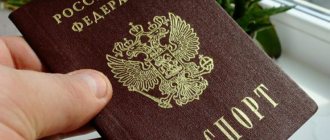The Constitution grants every citizen of the Russian Federation the right to freedom of movement throughout the state.
But along with the right, as we know, there also arises a duty. This obligation is related to the registration of a person at the place of residence or stay.
In this regard, the question often arises: how long can you live without registration in your passport in Russia according to the law?
Is it possible to live without registration according to the Law?
The term registration was abolished in the Russian Federation in 1993 with the signing of the Law “On the right of citizens of the Russian Federation to freedom of movement.”
The term was replaced by the concept of “registration of citizens at the place of residence ,” which was introduced for the purpose of notifying the FMS authorities about the movement of citizens within the country.
On the basis of this law, the constituent entities of the federation adopted their own Resolutions regulating the procedure for this procedure in a specific territory.
The law clearly distinguishes between the concepts of place of residence and place of temporary stay. The conduct and timing of each type of procedure are regulated by the “Rules for registration and deregistration of citizens of the Russian Federation” (Resolution No. 713 of July 17, 1995, as amended in 2010).
Permanent registration is registration in your own residential premises or municipal apartment provided under a social security agreement. hiring Temporary registration – registration at a temporary place of residence. This could be rented housing, an apartment for relatives, friends, office premises, a dormitory, etc.
For more details about why registration is needed, as well as about temporary and permanent registration, read this article, and you will learn about the difference between registration and registration, as well as how the place of stay differs from the place of residence, here.
Registration procedure
Documents for registration must be submitted to the Main Department of Migration of the Ministry of Internal Affairs. If the papers are completed correctly, and the applicant has taken into account the period within which he needs to register after leaving the apartment, the package will be accepted.
Permanent registration of citizens of the Russian Federation, including minors, is carried out within 3 days from the date of submission of all documents. If there is a need to clarify any information, the registration period will last up to 8 days. Typically, such requests are sent when confirming the right to dispose of residential premises.
Registration of foreigners in their permanent housing on the territory of the Russian Federation is carried out in approximately 3-7 days. This is quite enough not to break the law, considering how many days they give for registration after discharge.
How long can you live without registration in your passport?
According to the law, permanent registration can only be obtained in your own home or in a municipal apartment provided under a social security agreement. hiring
If a citizen deregisters, he must register in the new place seven days in advance. These deadlines are established by Government Decree No. 809 of August 15, 2014.
In order to meet the deadline, it is more advisable for a citizen to apply for registration when he arrives at a new place and automatically register from the old address. Carrying out the procedure in this way will avoid missing the registration deadline at your new place of residence.
Missing a deadline is permitted for a valid reason:
- Buying a home.
- Illness with treatment in a hospital or at home.
- Business trip to another city.
Each case requires confirmation by documents (certificates from the hospital, travel certificate, certificate from work, purchase agreement for living space).
How to live without printing
Is it possible to live without registration in Russia? Yes. To do this, it is enough to have a place of temporary registration.
In such circumstances, the citizen is issued a certificate in the established form. It serves as confirmation of registration in the Russian Federation at a particular address. Information about temporary registration will be stored in the migration services database.
Moreover, before receiving a passport, children are given certificates of permanent residence registration. This means that you can live in Russia without any stamps on your identity card, but you must have a document confirming your registration.
Deadlines for registration of foreigners
It is no secret that there is a constant influx of citizens from Uzbekistan, China and others. And here there are rules.
The same period, seven days , is established by law for notifying the FMS authorities when a foreign citizen is in Russia.
A foreign citizen is required to send a notification to the Federal Migration Service office about his arrival in Russia by postal notification or with the participation of the organization receiving him (you can find out how to register via mail here). This role can be played by legal entities and individuals.
The citizen is issued a migration card with a specified period at the place of temporary residence.
Temporary registration in Russia is valid for a period of 90 days. If the deadline is violated, the migrant faces a fine and deportation to his homeland.
We talked in more detail about the registration of foreign citizens and the necessary documents here.
How long do different categories of citizens need to register?
| Category of citizens | Deadlines for obtaining permanent registration | Additional requirements (documents, nuances) |
| Newborns | 7 days (after receiving the birth certificate) | Additional documents:
Nuances:
|
| Minors under 14 years of age | 7 days (from the date of discharge from the previous place of residence) | Additional documents:
Nuances: The child is registered only together with legal representatives. |
| Minors from 14 to 18 years old | 7 days (from the date of discharge from the previous place of residence) | Additional documents:
Nuances:
|
| Adults | 7 days (from the date of discharge from the previous place of residence) | The package of documents is standard, but may depend on the conditions and basis of registration. For example, if the premises are state (municipal) property, it is also necessary to obtain the consent of all adults living in this residential area (in writing). |
| Foreigners | 7 days (after crossing the border) | Additional documents:
|
*7 days is the general period established for all citizens for registration from the moment they begin living in a new place. The only differences will be in the timing of this period and the nuances of the procedure.
What if you miss deadlines?
Despite the document establishing the citizen’s right to freedom of movement, the state will punish you with a fine for not having a stamp. Article 19.15.1 of the Code of Administrative Violations provides for such a violation. According to this document, a citizen is required to register within seven days .
For missing a deadline, the code provides for penalties in the amount of one and a half to three thousand rubles, and for Moscow and St. Petersburg from 5 to 7 tons.
This rule applies to both permanent and temporary registration.
That is, even if there is a stamp in your passport, and you will be temporarily in another place, you must issue a temporary registration.
Facts of lack of registration can be identified by an official (when checking documents) or the Federal Migration Service when submitting documents for registration (you can find out about the necessary documents for registration and deregistration here).
You have the right to reside at any address that is not your permanent place of residence for up to 90 days. If you live in a rented apartment, you must obtain temporary registration in it no later than within 3 months.
The fine for its absence will be paid by the owner of the property in which you live.
For owners whose living space is occupied by citizens without registration, a fine of 3 to 5 thousand for regions, from 5 to 7 thousand for Moscow and St. Petersburg is also provided. Legal entities for such violations are subject to fines from 50 to 757 tons (Article 19.15.1 of the Code of Administrative Offenses).
Read more about fines for late registration or lack of registration in this article.
Regulations for temporary registration
It is established by law that anyone who is absent from their place of permanent registration for a long time must register its temporary equivalent at the address of residence. Based on this status, a citizen has the right to count on all the privileges intended for persons living in the region.
Registration at the place of residence is a common phenomenon. The deadlines for registration of citizens of the Russian Federation after discharge in 2021 are indicated in (hereinafter referred to as Law of the Russian Federation No. 5242-1).
When collecting documents for temporary registration, the applicant needs to decide how long he will be tied to his new place of residence. But since this period can only be set by the owner of the living space for which the migrant is registered, the parties should agree. If your temporary registration has expired, you can always extend it.
Temporary registration cannot be issued for a period of more than 5 years (6 months for municipal housing). This is a mandatory condition, even if the owner of the premises is ready to register the guest for a longer period. Although this information is not reflected in the legislation, it is enshrined in the internal regulations of the passport office departments.
Temporary registration is carried out at the place of stay if the person is in the locality for more than 90 days. This clearly regulates how long you need to register. After temporary registration, the person is issued a certificate, which is valid only with a Russian passport.
Temporary registration of a foreigner at the place of stay is called migration registration. The period for registering foreign citizens on the territory of the Russian Federation is determined by the period of temporary stay of foreigners from visa-free countries - no more than 90 days in total during each period of 180 days. The visa procedure between Russia and the country from which the subject came implies the registration of the latter with migration registration for the entire period of validity of the visa document.
The maximum period should not exceed 12 months.
The answer to the question of how long it takes to register at a new address is contained in various legal acts, the main one among which is
Features of registration when selling your home
Article 292 of the Civil Code of the Russian Federation prescribes the need to extract from an apartment when selling it. The timing of deregistration at this address may be established by the purchase and sale agreement. If the time frame is not established by this document, you should be guided by the Civil Code, which interprets the time period as “reasonable” .
In practice, it is equal to 30 days.
But how long can you live without registration after selling your apartment?
If you have checked out of a sold home, but have not found a new home within a month, then in theory you have nowhere to register.
According to the law, if the seven-day period is violated for a valid reason, no fine should be charged.
When purchasing an apartment and receiving a Certificate of Ownership, Rosreestr employees will put a mark that will allow you to avoid a fine.
However, there are precedents when a fine was imposed despite the presence of justifying documents.
When moving to another city, it is more advisable to arrange an automatic deregistration through registration. Just as in other cases, the registration procedure must be completed within 7 days.
If you do not have your own housing in which you can register, or housing where relatives or friends agree to register you, you need to register temporarily.
You can learn more about how to register in a new home after selling your old one here.
The registration period is no later than 90 days.
If you rent housing in another city, you must provide the FMS with a rental agreement or an application from the owner of the apartment you are renting. Violation of the terms of temporary registration is subject to a fine of the same amount as violation of the terms of permanent registration. The amount of the fine is constant and does not depend on the length of your stay without registration at your place of residence or stay.
How can it even happen that a person does not have registration?
If a person does not have a current mark in his passport indicating his place of residence
, his relationship with government mechanisms in some situations becomes significantly more complicated, and in others it stops altogether.
There are actually quite a lot of reasons why a person may be left without registration. A person may voluntarily de-register with the intention of registering elsewhere. However, for some reason (for example, family reasons), I was unable to register at the new place.
Various fraudulent schemes are also rumored
, as a result of which a citizen may lose not only registration, but also his apartment.
Apartments of lonely and elderly people are traditional targets for attackers. The scammers’ scheme of action is usually as follows: elderly and lonely people are taken into confidence and, at the right moment, are asked to sign legal papers that are passed off as an “employment contract” or “an application for humanitarian assistance.” After which the victim ends up on the street or in a nursing home.
Or, for example, another case. A citizen bought an apartment and registered at his place of residence
. However, after some time it turned out that the seller of the apartment was a mentally ill person. Such a deal can be challenged in court, for example, by his heirs. And as a result, a citizen may find himself on the street without an apartment or registration.
If there is nowhere to register
Lack of registration is an obstacle to a full life.
According to the law, a passport without a registration stamp is valid, but a citizen with such a document will face many obstacles in the following cases :
- seeking medical help;
- registration of a foreign passport;
- registration of SNILS;
- vehicle registration;
- registration with tax authorities;
- apparatus employed;
- obtaining a loan from a bank;
- registration of pension;
- receiving social benefits.
According to the law, the absence of a residence stamp in your passport should not be an obstacle to going to a clinic, bank, or getting a job.
However, practice shows that most often this still creates certain problems.
The Labor Code (Article 64) states that restrictions on hiring due to lack of registration are not permissible. But we all know that, for example, in Moscow, without Moscow registration, it is impossible to get a normally paid job. What can we say about the absence of any registration at all?
No registration means you can’t get a loan , since the bank’s security service will not risk allowing a person without a specific place of residence to take out a loan.
According to the rules, it is also possible to enroll a child in an educational institution without registration, but citizens living in the area where the educational institution is located have a priority right to enroll in the queue. So your child may not wait in line.
Therefore, it is advisable to contact relatives or friends who will agree to register you in their living space.
If there are none, you can try to contact intermediaries who can help you register for a certain fee in order to avoid unnecessary problems.
Extract "to nowhere"
Today in Russian legislation you can come across the term “discharge to nowhere”. This is a process where a person is deregistered and deprived of housing. In this case, he is not provided with a new place of residence.
This situation is illegal in some cases. For example, if we are talking about minors. By law, children cannot be discharged “to nowhere.” They need to immediately find a new place of residence, and if the child is under 14 years old, then it must be with one of the parents.
The discharge “to nowhere” is legal if we are talking about missing people or those recognized as dead. Recent changes in the legislation of the Russian Federation allow alimony debtors to be recognized as missing.
If a person suddenly shows up, he will be able to appeal the court decision and register in the apartment/house again. But until this moment you will have to stay on the territory of a particular state without registration.
Advice for those without registration
Each individual case of a missing stamp in a passport may have different reasons, but the problem still needs to be solved . If you do not have a residence permit and have nowhere to register, you can do the following:
- Register at the hostels (there are organizations that provide temporary registration).
- Buy an inexpensive house in some remote village and register in it.
- Register in a country house or garden house located on the territory of a rural settlement.
- Register with the owners for a fee or by agreement.
Someone can confidently say: “I live without registration and everything is fine.” However, the absence of a registration stamp from the Federal Migration Service can become a source of many problems with their consequences. Therefore, it is still worth trying and formalizing it in any currently available way. Otherwise, even walking down the street in our time will not be so safe.
Concept and purpose of registration
Registration is a form of registration of citizens of the Russian Federation, foreigners and stateless persons. According to Russian legislation, all of them must have permanent or temporary registration, which is issued at the place of residence or actual location.
Monitoring compliance with migration norms is carried out by a special service within the Ministry of Internal Affairs. The employees of this authority will tell you whether you need to be discharged with a new registration and in what time frame this should be done.
Although the registration/discharge process is generally the same for all applicants, the specifics of the procedure may differ slightly. The nuances are due to the following factors:
- home owner;
- type of accounting: primary or repeated;
- type of registration: permanent or temporary.
However, regardless of the type of registration, registration is free of charge.
A citizen who has changed his place of residence must notify the authorized bodies of this within the period established by law and provide the necessary documents.
In the context of collecting papers, it is worth mentioning whether it is possible to register without an extract from your previous place of residence. This is actually possible, since the migration authority itself submits in this case a request to deregister the applicant for new registration.
To avoid confusion in terminology, we suggest that you read the additional material “What is the difference: registration and registration”.
How to pay a fine
The commission of an offense, as well as the punishment for it, is recorded in the protocol, and in case of fictitious registration - in the court verdict.
After the documents enter into legal force, the offender must pay a fine. To do this, you must have payment details or a scanning ID and select one of the following methods for transferring money:
- payment at a bank at a cashier, through a terminal or online banking services;
- transfer at a Russian Post office;
- payment through a terminal at the police department of the Ministry of Internal Affairs;
- online using payment ID.
By the way, at State Services it is possible not only to make payments using a bank card, but also to repay debt with money from an electronic wallet and from a phone.
After payment, we recommend keeping the receipt to avoid possible disputes about repayment of the fine.
Find out more about how to pay a fine for failure to register at your place of residence.
How to obtain permanent registration
The process begins with the applicant providing a passport. Registration is issued by the owner of the home or a relative living in it. It needs to be certified by the Federal Migration Service. Registration takes up to three days.
The procedure is free and not subject to state tax. The Federal Migration Service issues the applicant a document confirming the fact of registration. The citizen must have with him a document confirming the right to registration.
He takes the paper received from the FMS to the employees of the passport office. There is no specific deadline for registration. The responsible person just needs to put a stamp and enter the data. How long this will take is unknown.
Advice! There is no need to go anywhere now. Obtaining permanent registration is possible through the State Services website.
Registration Rules
How long can you live without registration in Moscow? Finding the answer to this question will no longer take much time. Everyone will be able to quickly navigate depending on their life situation.
When applying for registration, you need to remember some simple rules. These include the following features:
- Registration in your own housing is possible at any time, in someone else's - with the consent of all owners of the apartment or house.
- Temporary registration can be obtained not only in a house/apartment, but also in a sanatorium, hotel, hostel, and so on.
- To register minor children with their parents, permission from the owner of the residential property is not required.
- The owner of the property can register close relatives without the consent of the co-owners of the property. These include children, as well as spouses and parents.
By remembering these rules, you can avoid most problems. What else is important to know about registration actions?
The most important document of a Russian citizen is a Russian passport.
The Russian passport is the main identification document in the Russian Federation. The Government of the Russian Federation, by its resolution No. 828 dated July 8, 1997, obliges all Russian citizens aged 14 years or more who reside in the country to have a Russian passport.
The document is a small book of 20 pages. The dark red cover is embossed with the coat of arms of the Russian Federation and the inscriptions:
- above the coat of arms - “Russian Federation”;
- under the coat of arms - “Passport”.
The document contains, in addition to the number, series, date of issue and name of the authority that issued it, the owner’s personal data: full name, gender, birth information and other data, including place of residence, military registration, etc.
A single sample document has been adopted for all subjects of the Federation; The republics are entitled to supplement it with an insert, which is agreed upon with the Ministry of Internal Affairs and the Heraldic Council of the Russian Federation and duplicates the passport data in the national language. The document is issued when citizens reach 14 years of age, and its replacement is provided at 20 and 45 years of age.
We recommend that you learn more about the procedure for obtaining and replacing a Russian passport.
Does the employer have the right to require registration?
Failure to register does not in any way affect the possibility of refusal of employment.
This is due to the fact that the Labor Code provides a list of acts that the employer has the right to request:
- Passport (it is also possible to provide any other document that can verify a person’s identity).
- SNILS.
- Military ID.
- A document confirming the required qualifications.
- A document confirming the absence of criminal or other liability.
This list is closed. This means that the employer has no right to demand any other acts. In practice, the manager may ask to provide this or that certificate, but whether to submit it or not is solely the prerogative of the employee.
No temporary or permanent registration is required.
Registration Guide
For example, how to act to achieve a given task. It's not as difficult as it seems at first glance.
To register, you need:
- Prepare documents for the relevant operation. They are presented below.
- Find housing suitable for registration. If necessary, obtain the consent of the owners for the operation.
- Give the prepared documents to the property owner.
- Submit an application (this is done by the property owner) for registration.
- Pick up your registration documents.
Registration itself is free, but homeowners often secretly demand payment for registration. It is better to discuss how much you will need to pay with the specific owner of the property. We found out how long you can stay in Moscow without registration.
Important: on “State Citizen Registration”. You can then follow the on-screen prompts. They will help you cope with the task.
conclusions
A citizen of the Russian Federation must live in the place where he is registered for permanent residence, and if he moves, inform the registration authorities about this. This rule also applies to foreigners. Living outside the place of registration entails administrative and sometimes criminal liability. Moreover, not only the registered person will be responsible, but also the one who committed the violation: the owner of the apartment (individual or legal entity) and officials involved in registration actions.







